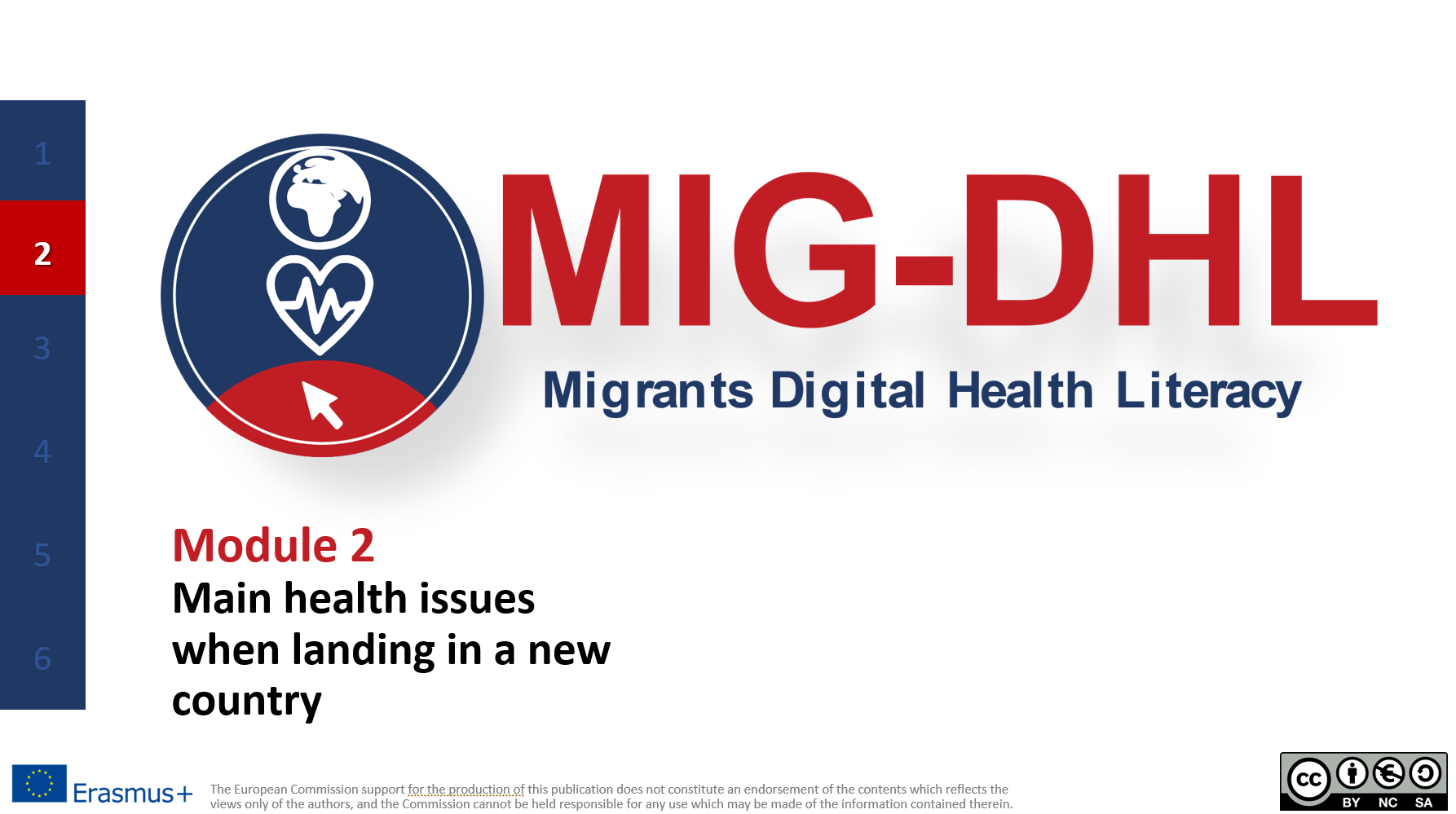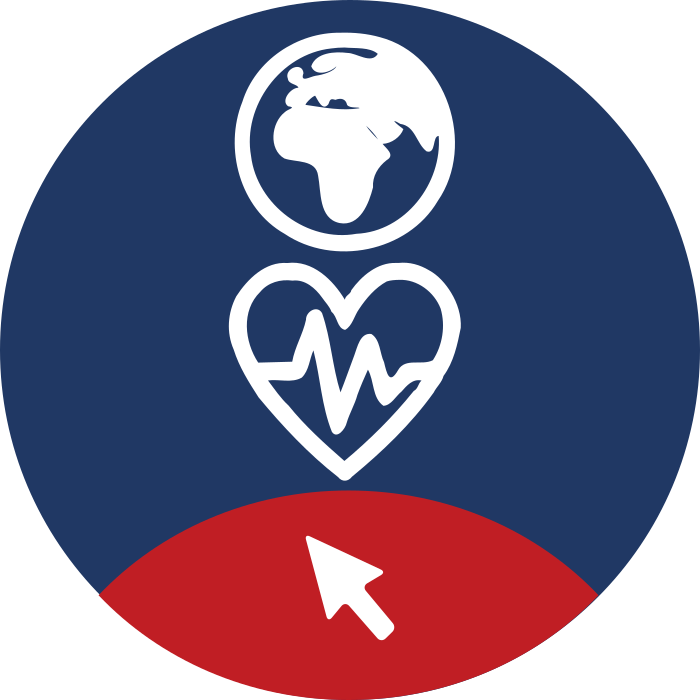Course 2 - Main health issues when landing in a new country (Course2-EN)
Training the Trainers on Module 2 - "Main health issues when landing in a new country"
Authors:
Karin Drda-Kühn, MediaK,
Nikol Papaevgeniou, Prolepsis
Objectives
✔ To understand the various risks to migrant health during all the stages of the migrant journey.
✔ To understand the cultural differences influencing health narratives between the country of origin and the host country
✔ To use online tools that can facilitate understanding of health issues and country specific health related circumstances (how health is perceived and treated in host countries compared to country or origin)
✔ Learn relevant to health country specific terminology and explore useful online tools
✔ To understand the main health protective behaviours and learn how to find reliable relevant online sources.
✔Develop a health checklist in their own language
Competences
✔ Understanding differences about health and health treatment in the country of origin and the country of arrival
✔ Understanding how culture can affect health narratives
✔ Gaining knowledge on specific physical and mental health risks migrant populations are at risk of during the migrant journey, learn how to use relevant online sources
✔ Gaining knowledge about specific prevention and health promotion strategies and use relevant online tools
✔ Gaining awareness about Digital Health Literacy’s relevance for migrants’ health
Materials
- Handbook for the trainer (PDF) - For preparing a face 2 face training session. Explains the slides.
- Slides of Module 2 for the trainer (PDF, PPT) - To be used by a trainer in face 2 face training session.
- Online Training Module 2 for the trainee (LINK) - To be used by a trainee in the online training session.
- Guidelines for all Designed Practical Training Activities (DPTAs) for the trainer (PDF) - For preparing the Practical Activities in a face 2 face training session.
The European Commission support for the production of this publication does not constitute an endorsement of the contents which reflects the views only of the authors, and the Commission cannot be held responsible for any use which may be made of the information contained therein. Project number: 2020-1-DE02-KA204-007679.
LessTraining the Trainers on Module 2 - "Main health issues when landing in a new country"
Authors:
Karin Drda-Kühn, MediaK,
Nikol Papaevgeniou, Prolepsis
Objectives
✔ To understand the various risks to migrant health during all the stages of the migrant journey.
✔ To understand the cultural differences influencing health narratives between the country of origin and the host country
✔ To use online tools that can facilitate understanding of health issues and country specific health related circumstances (how health is perceived and treated in host countries compared to country or origin)
✔ Learn relevant to health country specific terminology and explore useful online tools
✔ To understand the main health protective behaviours and learn how to find reliable relevant online sources.
✔Develop a health checklist in their own language
Competences
✔ Understanding differences about health and health treatment in the country of origin and the country of arrival
Training the Trainers on Module 2 - "Main health issues when landing in a new country"
Authors:
Karin Drda-Kühn, MediaK,
Nikol Papaevgeniou, Prolepsis
Objectives
✔ To understand the various risks to migrant health during all the stages of the migrant journey.
✔ To understand the cultural differences influencing health narratives between the country of origin and the host country
✔ To use online tools that can facilitate understanding of health issues and country specific health related circumstances (how health is perceived and treated in host countries compared to country or origin)
✔ Learn relevant to health country specific terminology and explore useful online tools
✔ To understand the main health protective behaviours and learn how to find reliable relevant online sources.
✔Develop a health checklist in their own language
Competences
✔ Understanding differences about health and health treatment in the country of origin and the country of arrival
Course Description

Objectives
This DPTA 2 “Main health issues when landing in a new country” focuses on raising awareness about the health issues migrants are particularly prone to when arriving in a new country. This module will focus on factors which influence health before, during and after arrival in the new country. Each of these phases impact on the physical and mental health of migrants, and in some cases they are interrelated and mutually dependent. Health issues are not only manifested in disease symptoms.
They also have to do with language and terms, and different ways of dealing with illness. Behind symptoms and their description there are often also culture-specific narratives, and migrants and their doctors should also be sensitised to this. The module describes the most common diseases and corresponding treatments a migrant may face in the host country and how these can be addressed using digital means. Another goal of the training is to explore the main health determining behaviours that are related and influence health and health outcomes.
Learning objectives:
- To understand the various risks to migrant health during all the stages of the migrant journey.
- To understand the cultural differences influencing health narratives between the country of origin and the host country
- To use online tools that can facilitate understanding of health issues and country specific health related circumstances (how health is perceived and treated in host countries compared to country or origin)
- Learn relevant to health country specific terminology and explore useful online tools
- To understand the main health protective behaviours and learn how to find reliable relevant online sources.
- Develop a health checklist in their own language
Participants & roles
- Migrants: About 10 (newcomer) migrants in each country as beneficiaries of the training.
- Migrant peers: About 1-2 migrant peers, who are key persons in the migrant communities or are already integrated in the host country. These persons are to be treated as confidants within the learning processes. They therefore have a dual role: an affirmative role ("Yes, I also had this experience when I started to deal with the health system in the country of arrival.") and an encouraging role ("It took me a while to figure everything out, but there is a lot of support around."). It is very important that this role is clearly communicated in advance. Peers may even play the role of trainers in certain cases.
- Health professionals (about 1-2): The expected role of health professionals is to actively participate in the sessions (optional), in the same way as migrant peers will. It is therefore advisable to invite health professionals to participate in the different sessions of this DPTA as observers and with access to the materials on the online platform in case they want to observe (and even conduct) the online tasks.
Competences
- Understanding differences about health and health treatment in the country of origin and the country of arrival
- Understanding how culture can affect health narratives
- Gaining knowledge on specific physical and mental health risks migrant populations are at risk of during the migrant journey, learn how to use relevant online sources
- Gaining knowledge about specific prevention and health promotion strategies and use relevant online tools
- Gaining awareness about Digital Health Literacy’s relevance for migrants’ health
Training contents
- Learning the health risks to migrants across the migrant journey
- Learning how culture can affect the health narrative
- Learning about the differences of health and health treatments between the host country and the country of origin. Use online relevant tools
- Learning about prevention and health promotion strategies and how to use online sources for doing so.
Duration
Duration of the sessions: 4’30 hours.
- Face to face session: 3 and a half hours
- Online session: 1 hour.
Transversal training
- Social skills
- Language skills or skills to organise access to different languages (via interpreters or technical support devices)
- Being sensitive to other cultures especially when coping with health questions
- Ability to lead teamwork with trainees from different cultural backgrounds
- Skills to put in practice theoretical contents.
-
Methodology
- Active and participative
- Face to face training:
- Educational training
- Group discussion
- Case studies - role playing
- Teamwork
- Online training:
- Watching some selected material (videos etc)
- Practical implementation - through assignments- of some tips agreed in the classroom.
- Some collaborative work
Training materials
- Face to face sessions:
- PowerPoint presentations
- Word documents. Explaining the main concepts shown on PPT
- Selected videos
- Online sessions:
- Online assignments in the training platform
- Tasks to be implemented during a given time frame
This DPTA 2 “Main health issues when landing in a new country” focuses on raising awareness about the health issues migrants are particularly prone to when arriving in a new country. This module will focus on factors which influence health before, during and after arrival in the new country. Each of these phases impact on the physical and mental health of migrants, and in some cases they are interrelated and mutually dependent. Health issues are not only manifested in disease symptoms.
They also have to do with language and terms, and different ways of dealing with illness. Behind symptoms and their description there are often also culture-specific narratives, and migrants and their doctors should also be sensitised to this. The module describes the most common diseases and corresponding treatments a migrant may face in the host country and how these can be addressed using digital means. Another goal of the training is to explore the main health determining behaviours that are related and influence health and health outcomes.
Learning objectives:
- To understand the various risks to migrant health during all the stages of the migrant journey.
- To understand the cultural differences influencing health narratives between the country of origin and the host country
- To use online tools that can facilitate understanding of health issues and country specific health related circumstances (how health is perceived and treated in host countries compared to country or origin)
- Learn relevant to health country specific terminology and explore useful online tools
- To understand the main health protective behaviours and learn how to find reliable relevant online sources.
- Develop a health checklist in their own language
- Migrants: About 10 (newcomer) migrants in each country as beneficiaries of the training.
- Migrant peers: About 1-2 migrant peers, who are key persons in the migrant communities or are already integrated in the host country. These persons are to be treated as confidants within the learning processes. They therefore have a dual role: an affirmative role ("Yes, I also had this experience when I started to deal with the health system in the country of arrival.") and an encouraging role ("It took me a while to figure everything out, but there is a lot of support around."). It is very important that this role is clearly communicated in advance. Peers may even play the role of trainers in certain cases.
- Health professionals (about 1-2): The expected role of health professionals is to actively participate in the sessions (optional), in the same way as migrant peers will. It is therefore advisable to invite health professionals to participate in the different sessions of this DPTA as observers and with access to the materials on the online platform in case they want to observe (and even conduct) the online tasks.
- Understanding differences about health and health treatment in the country of origin and the country of arrival
- Understanding how culture can affect health narratives
- Gaining knowledge on specific physical and mental health risks migrant populations are at risk of during the migrant journey, learn how to use relevant online sources
- Gaining knowledge about specific prevention and health promotion strategies and use relevant online tools
- Gaining awareness about Digital Health Literacy’s relevance for migrants’ health
- Learning the health risks to migrants across the migrant journey
- Learning how culture can affect the health narrative
- Learning about the differences of health and health treatments between the host country and the country of origin. Use online relevant tools
- Learning about prevention and health promotion strategies and how to use online sources for doing so.
Duration of the sessions: 4’30 hours.
- Face to face session: 3 and a half hours
- Online session: 1 hour.
- Social skills
- Language skills or skills to organise access to different languages (via interpreters or technical support devices)
- Being sensitive to other cultures especially when coping with health questions
- Ability to lead teamwork with trainees from different cultural backgrounds
- Skills to put in practice theoretical contents.
- Active and participative
- Face to face training:
- Educational training
- Group discussion
- Case studies - role playing
- Teamwork
- Online training:
- Watching some selected material (videos etc)
- Practical implementation - through assignments- of some tips agreed in the classroom.
- Some collaborative work
- Face to face sessions:
- PowerPoint presentations
- Word documents. Explaining the main concepts shown on PPT
- Selected videos
- Online sessions:
- Online assignments in the training platform
- Tasks to be implemented during a given time frame

- Type: Online session
- complementary to the face 2 face, for trainees who follow the f2f training
- for self-paced, unattended learning, for any trainee
- Duration: 1 hour

